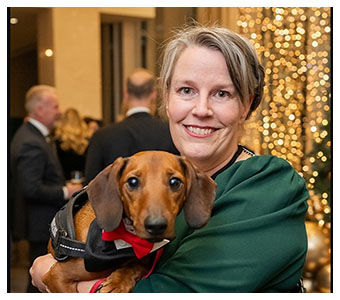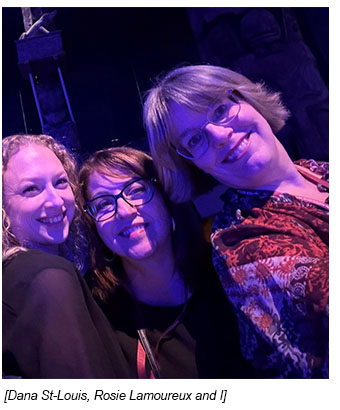Deborah Doucet shares the role self-care and allyship have played in her mental health journey.

For those of you who do not know me, I was diagnosed with Major Depressive Disorder (MDD) as well as Post-Traumatic Stress Disorder (PTSD). Over the last 15 years or so, the former is treated with medication, while the latter is being treated with therapy and my dog, Winston, who is fast becoming a celebrity in the Toronto and Ottawa offices.
In recognition of World Mental Health Day, I wanted to share some self-care tips and tricks and mindful acts that have both helped me recover from a “Big Crash” (think stuck in bed for days, leaving only to let dogs out, eat peanut butter or raw pasta and use the necessary) and prevented re-occurrence when I find myself starting to slip, medication notwithstanding.
I recognize that my treatment of my illness is different from others’ treatment and that what I find helpful may not be helpful for others.
My work teammates have also adopted behaviours that are impactful in recovery, and to underscore the important roles that allyship and teamwork have played in my life as someone who suffers from mental illness, I’m going to use the metaphor of doing a bicycle marathon through the Rockies…
Imagine you are part of a team, competing in this multi-day mountain bike marathon. [Stage whisper: I have never done so myself, loathing the idea of hard exercise and extreme sports, so I am definitely imagining along with you here.] The prize at the end is an all-inclusive vacation to a luxury resort on a private island in the Caribbean – and of course, the beauty of the journey itself, unparalleled views, time in nature and bonding with your team. The only requirement to win the prize is for ALL members of the team complete the course together.
One of the team members, however, has a bad knee. All the team members know this and understand they may need to step in and help their teammate get over some of the rough patches from time to time. They also realize that this team member could benefit from the vacation prize as much as the rest of them.
In this scenario, the “bad knee” is debilitating mental illness, and of course, I am the teammate that has it.
We get to a part of the course where my knee simply WILL NOT allow me to continue forward. And so there I sit on a fallen tree, in the middle of the trail, bike on its side beside me and pack at my feet. The thought of even lifting the bike fatigues me. I cannot stand. I am just too weak and broken at this point.
My teammates have continued upwards a way, not yet realizing that I’m stopped until I call out. In real life, that “call out” is me emailing my colleagues, letting them know I am down. Immediately, the rest of my team has stopped and comes back to assess. One grabs my backpack. The other grabs my bicycle. The third grabs my hand and helps me up – my checkpoint to whom I will report to when I am ready to take back my belongings and continue properly, after I have tended to myself and worked through the kinks.
This is, very fortunately, exactly how the colleagues in my various teams have responded at work. No questions asked – simple acceptance that I cannot “do” at the moment, and without any resentment or other forms of micro-aggression, picking up what is necessary to carry until I am able. I feel indescribably grateful to them, and it is that gratitude for their unwavering acceptance and assistance that has allowed me to bounce back – to ensure that THEY don’t become over-burdened with what I should be doing. It is a mutual and sincere caring for each other that allows for its success.

So how does one get back to one’s Normal Functioning Self? And what is my form of “self-care”?
Paradoxically, in this case, “self-care” is asking for help from those around me. First, from my colleagues, and then secondly, in the event I am in an extremely bad state, from my neighbour or friends or family. But it also requires parenting myself. It requires stepping outside of myself to clinically assess basic needs and address them one at a time.
First and foremost, I sleep to reset my brain for as long as I need until I feel like I can manage little things, like a short walk with the dogs, washing dishes or starting a load of laundry.
During the waking moments, I take stock to make sure I haven’t missed any of my medication doses or supplements. If I have, I catch up and order what I may have run out of.
I also order from my phone’s grocery app my “Recovery” grocery list to re-stock my food supply (it is ALWAYS empty when there’s a Big Crash). Although not diabetic or hypoglycemic, I do find that what I put in my body is essential to my own recovery, re-balancing blood-sugar and therefore energy levels. The foods are simple whole foods, items I can eat without having to prepare anything, such as bagged salads, fruits, and yogurts. Additionally, I have a meal plan created by a nutritionist specifically for me, my mental condition, and my age. If you are able, I HIGHLY recommend doing this.
Usually, it will be 1-2 days before I am able to take on more tasks towards self-care, and can do some simple meal prep for the week. And by simple, I mean SIMPLE, such as sandwiches and pasta salad – I am no chef (just ask my kids!). Everything (including snacks) is portioned into single servings so that I can just grab and eat without having to think/stress/work at it.
I also cut out the toxic stuff – namely alcohol (I’m not a marijuana fan at all) and curb my coffee and tea intake because of the caffeine jolts and crashes. Surprisingly, I tend to have more energy drinking half and half caff/decaf as opposed to full-on caffeinated coffee. I also sleep better at night. I avoid processed and fast foods.
Shifting back to the marathon scenario, as the team and I approach the crest of the mountain incline, I find I can now take back my bicycle, and I am back at work.
Finally, and again, paradoxically, I reach out to others, usually my children but also just with my work group during the workday - this time because I know I am more invested and interested in their well-being than I am in myself. Allowing empathy in – celebrations of their joys or concern at their challenges and a genuine desire to help – is one of the most enriching and empowering forms of self-care I can take to recover. Empathy is a safe emotion because it stems from love and true connection. It allows me to embrace Feeling.
I take the dogs for slightly longer walks – or to the off-leash park. I re-stock the fridge and pantry with some variants to the Recovery meal plan. I pre-make some slow-cooker meals – things I can freeze for when low times come.
I haul the backpack off my teammate’s back at the top of the hill, put it on my self and get back on the bike, to continue and build up momentum for the next incline.
You will note in this recitation of self-care, that there are no gym workouts, spa days, jogging or even baths with bubbles and wine that most would normally associate with self-care. For me, self-care is returning to the most basic hierarchy of needs – food, rest, and safe haven. It is enabling myself to do the essentials that Depression may sometimes otherwise prohibit, medication notwithstanding.
But self-care is ALSO admitting my own weaknesses and inabilities, and while they can slow me, and sometimes even stop me altogether – in reaching out for help, I care better for myself. I have found strength in admitting my vulnerabilities to others. I have discovered the enabling power of unconditional support from my colleagues in that I want to DO better and BE better for them – to reach deeply for my best self to give back to them.
And most importantly, unwavering acceptance of my condition allows me to also accept MDD and PTSD for what they are. There is less shame, frustration, guilt, and despair. Less disappointment and greater hope for longer stretches of normalcy.



